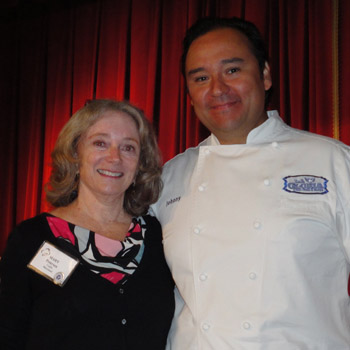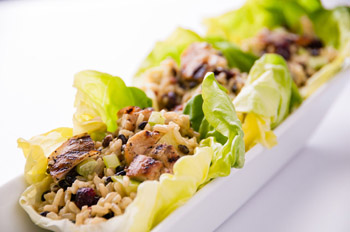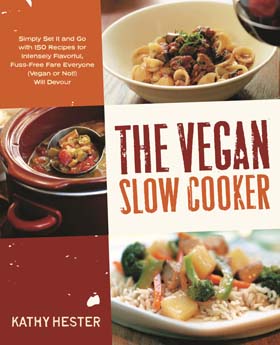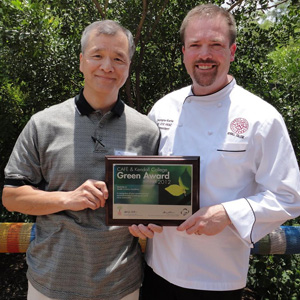Jones Dairy Farm Awards Scholarships to Two More Culinary Institute of America Students
Culinary Institute of America (CIA) students Aubrey King and Jose Frayre are the two most recent recipients of The Jones Dairy Farm Scholarship Fund at the CIA, said Philip Jones, sixth-generation president of Jones Dairy Farm and a professionally trained chef.
Established in May 2006, the Jones Dairy Farm Scholarship Fund supports three scholarships each year. CIA juniors and seniors pursuing baccalaureate degrees in Culinary Arts Management can apply for the scholarship by submitting a short essay and original recipe using a Jones’ product. Awards are restricted to students with a demonstrated financial need and G.P.A. of 3.0 or higher. More information about the program is found at www.jonesdairyfarm.com

 Chef Johnny Hernandez inspires foodservice educators at the 2012 CAFÉ Leadership Conference in San Antonio.
Chef Johnny Hernandez inspires foodservice educators at the 2012 CAFÉ Leadership Conference in San Antonio. Based on Mintel research, as age increases, so does the likelihood that adults are maintaining a mostly healthy diet.
Based on Mintel research, as age increases, so does the likelihood that adults are maintaining a mostly healthy diet. Measuring digestibility, researchers find almonds provide 20% fewer calories than labels state. The results might have implications for other foods, as well.
Measuring digestibility, researchers find almonds provide 20% fewer calories than labels state. The results might have implications for other foods, as well. So Americans don’t cook anymore? That used to be true. The current economic climate has wrought good news for publishers of consumer cookbooks as U.S. households eat more meals at home, reports NPD.
So Americans don’t cook anymore? That used to be true. The current economic climate has wrought good news for publishers of consumer cookbooks as U.S. households eat more meals at home, reports NPD. One-third of the nation’s population 19 years old and younger is expected to be Latino by 2015. A Dallas-based pizza chain is already preparing for the slew of new customers.
One-third of the nation’s population 19 years old and younger is expected to be Latino by 2015. A Dallas-based pizza chain is already preparing for the slew of new customers. Legendary pastry chef and baker Dieter Schorner continues to teach undergraduates at the CIA every day.
Legendary pastry chef and baker Dieter Schorner continues to teach undergraduates at the CIA every day. In an era of social networking, having real conversations and deepening your connections with people takes skill and will. But the byproducts are new energy and excitement—and being heard.
In an era of social networking, having real conversations and deepening your connections with people takes skill and will. But the byproducts are new energy and excitement—and being heard. Here are the remaining five of 10 critical things you must teach your students if you want them to earn meaningful jobs, plus some sound advice on how to interact with potential employers.
Here are the remaining five of 10 critical things you must teach your students if you want them to earn meaningful jobs, plus some sound advice on how to interact with potential employers. Seattle Culinary Academy and UMass Dining recognized for innovations in sustainability.
Seattle Culinary Academy and UMass Dining recognized for innovations in sustainability.